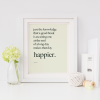Read:

Do you read books anymore? I mean real, whole, chapter-by-chapter books? When was the last time you sat down with a book and read for an hour straight, without stopping to check your phone for a text or email, or taking a break to look up something on your tablet?
It turns out that online reading–emails, social media updates, articles, even this blog post–is stunting our ability to maintain our focus long enough to read whole chapters at a time in a book. As Hugh McGuire writes in this Medium article on Why We Can’t Read Anymore, which I love so much I want to quote it for days and weeks until people ask me to please shut up:
It turns out that digital devices and software are finely tuned to train us to pay attention to them, no matter what else we should be doing. The mechanism, borne out by recent neuroscience studies, is something like this:
New information creates a rush of dopamine to the brain, a neurotransmitter that makes you feel good.
The promise of new information compels your brain to seek out that dopamine rush.
With fMRIs, you can see the brain’s pleasure centres light up with activity when new emails arrive.So, every new email you get gives you a little flood of dopamine. Every little flood of dopamine reinforces your brain’s memory that checking email gives a flood of dopamine. And our brains are programmed to seek out things that will give us little floods of dopamine. Further, these patterns of behaviour start creating neural pathways, so that they become unconscious habits: Work on something important, brain itch, check email, dopamine, refresh, dopamine, check Twitter, dopamine, back to work. Over and over, and each time the habit becomes more ingrained in the actual structures of our brains.
How can books compete?








